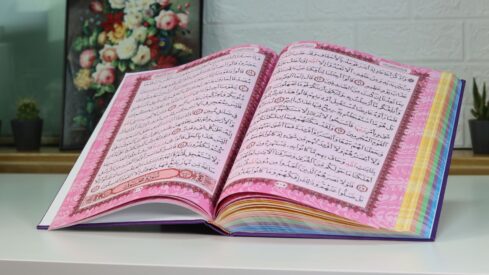{Unquestionably, by the remembrance of Allah hearts are assured.} (Ar-Ra’d 13: 28)
In the last article in this section, we wrap up the things we have to do in our journey to gain tranquility of the heart with the remembrance of God.
When we try to figure out why we are so often bothered, why we feel disturbed internally, or why we feel sad – we need to go back to our hearts.
The Prophet Muhammad (peace be upon him) said:
“Do not talk too much without remembering and mentioning Allah, for too much talk without mentioning Allah hardens the heart, and the person farthest from Allah is the one with a hard heart.” (At-Tirmidhi)
Subhan Allah (glory to Allah) – our heart hardens when we do not remember God. The heart’s nourishment is the remembrance of God, and when we fail to remember Him, it is no wonder that we feel down for no apparent reason.
The Muslim Scholar, Ibn al-Qayyim stated: “In the heart there is hardness which can only be softened by remembrance of God. So the slave must treat the hardness of his heart with the remembrance of God.” For those of us who feel that Islam itself has become heavy upon us, look at the answer the Prophet Muhammad gave to a man who said:
“O Messenger of Allah, the laws of Islam seem to be a lot for me (to remember), so tell me something that I should stick to.” The Prophet replied: “Let your tongue never cease to be moist with the remembrance of Allah.” (At-Tirmidhi)
And what is the effect of this remembrance? It acts as a polish for the hearts from its rust, and causes us to be remembered by God the Most High. God tells us in this amazing hadith qudsi:
“I am to my servant as he expects of Me, I am with him when he remembers Me. If he remembers Me in his heart, I remember him to Myself, and if he remembers me in an assembly, I mention him in an assembly better than his…” (Al-Bukhari and Muslim)
So What Exactly Is Remembrance?
Remembrance of God includes specified dhikr (such as saying subhan’Allah, la ilaha ila Allah, etc.), but it is also anything you do related to God or mentioning God. Anything that you do with God in mind – whether it is thinking well of Him, giving charity with the specific intention of doing it for His sake, making du’a’ (supplication) and so on is within the realm of dhikr.
Ways of Dhikr
Let’s get more specific. What are the things we can do that are included in dhikr?
Intention
Like we said in the article on earning Allah’s love, we need to immerse ourselves in good works. That said, when we do good, we must always try to be conscious of the fact that we are doing it for God. Talk to God as you are doing the good deed, ask Him to accept it from you, and to enable you to do more good. Add intentions – such as doing it for God, following the Sunnah (tradition of the Prophet), helping fellow Muslims and people – the more you remember God, the more He will remember you. And inevitably you will feel that in your life.
Remember, when we do good, we need to do good with the heart. We probably do certain things anyway – such as giving charity here and there, making du`a’ and so on. But we do them without heart, without any feeling or emotion that this is for God. We need to do these things knowing that in them is a cure for what is in our hearts, and that when we feel down, we go to these things – whether it is helping out others or pleading with God in our sujud (prostration).
Turning to Him
“Whoever comes to me walking, I go to him at speed.” (Al Bukhari)
It is impossible for you to return to God and He rejects you. Look at all these hadiths on those who return to Him:
”Allah is happier when a servant of His repents to Him than a man who was on his camel in a waterless desert and the camel escaped from him with his food and water. When he has lost hope of finding it, he retired to a tree and lied down under its shade. As he was there, the camel suddenly appeared in front of him. He took hold of its halter and said in his state of excessive joy: ‘O my Lord You are my servant and I am Your Lord.’ He uttered this erroneous statement as a result of his being overjoyed.” (Muslim)
God says in a beautiful hadith qudsi (sacred hadith):
“O son of Adam, so long as you call upon Me and ask of Me, I shall forgive you for what you have done, and I shall not mind. O son of Adam, were your sins to reach the clouds of the sky and were you then to ask forgiveness of Me, I would forgive you. O son of Adam, were you to come to Me with sins nearly as great as the earth and were you then to face Me, ascribing no partner to Me, I would bring you forgiveness as great.” (At Tirmidhi)
“Remember Allah during times of ease and He will remember you during times of difficulty” (At Tirmidhi)
Thanking Him
{And [remember] when your Lord proclaimed, ‘If you are grateful, I will surely increase you [in favor]…} (Ibrahim 14: 7)
Thanking is recognizing and appreciating. The more you thank, the more you will see. The more you see how God has blessed you, you see His presence in your life and this in itself should create a certain soothing of the heart. By thanking God, you are recognizing He is al-Wahhab (the Giver of gifts), ar-Razzaq (the Sustainer), al-Wadud (the Most Loving) and insha’Allah (God willingly) you will be able to recognize how He manifests His attributes and Names in your life. Take the time out every evening to thank God for the blessings in your day – not only will you be overwhelmed because you will never be able to enumerate them, but you will truly recognize God’s presence in your life.
Daily Word
{And remember your Lord much and exalt [Him with praise] in the evening and the morning.} (Al-Imran 3: 41)
We know that the Prophet Muhammad always remembered God – this is why we have du’a’ (supplication) and dhikr (remembrance) for almost everything we do: from entering into the restroom to what to say when someone compliments us. The Prophet also had specific remembrances that he said every morning and every evening. Each of these words and phrases are precious – not only do they polish your heart and cleanse them of their disturbances, but the Prophet would say them for protection, and that in itself should give us peace of mind and heart. Yaqeen (certainty) is so important – if the Prophet has told us that saying certain words will have an effect – we should have no doubt.
We should take the time to understand these words, so that they truly enter our hearts.
May Allah make us of people {who remember Allah while standing or sitting or [lying] on their sides and give thought to the creation of the heavens and the earth, [saying], “Our Lord, You did not create this aimlessly; exalted are You [above such a thing]; then protect us from the punishment of the Fire.} (Al-Imran 3: 191)
By Jinan Bastaki


















